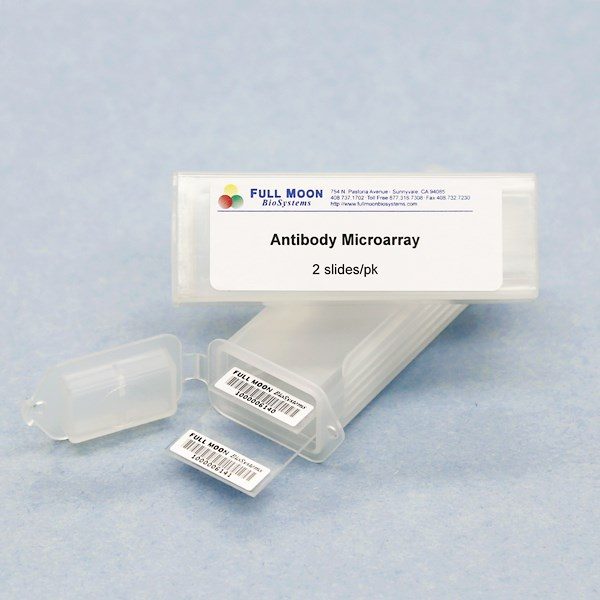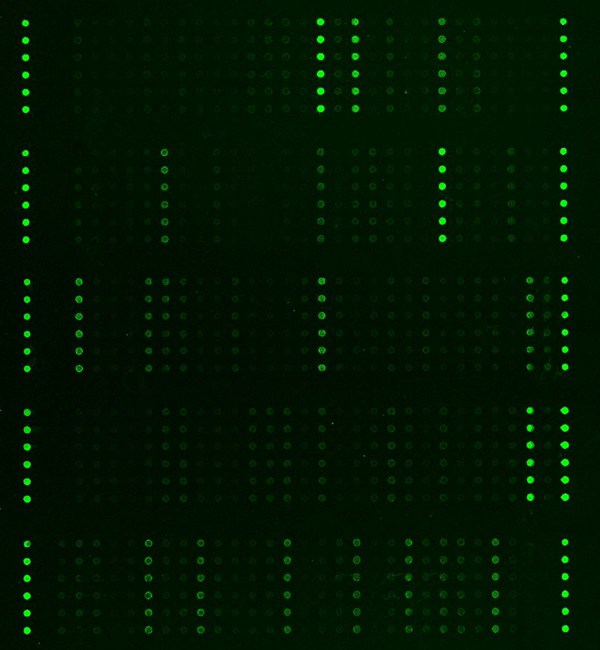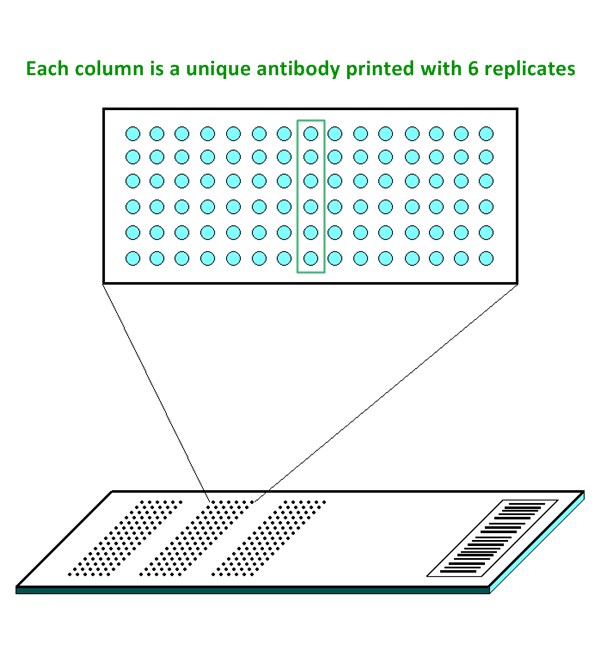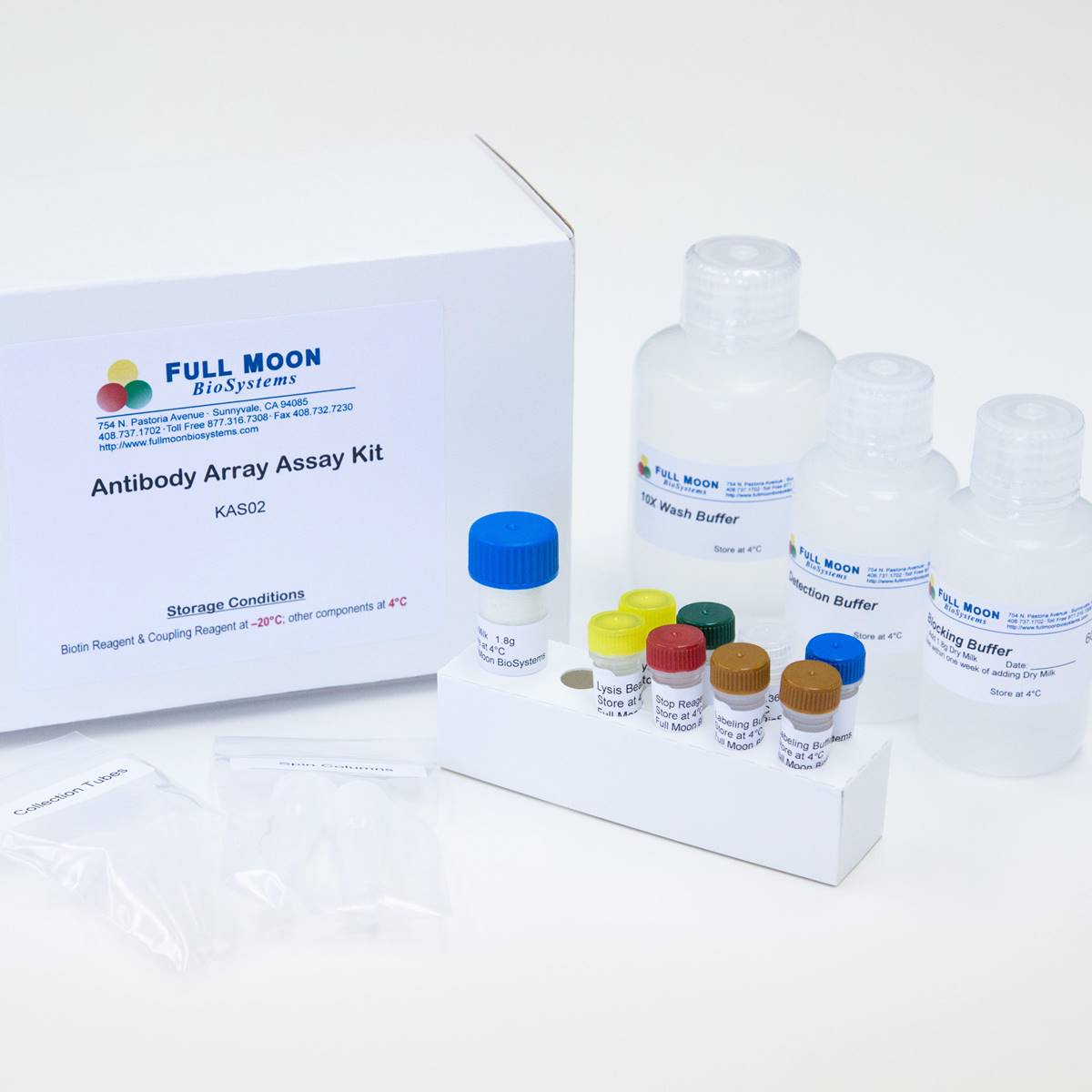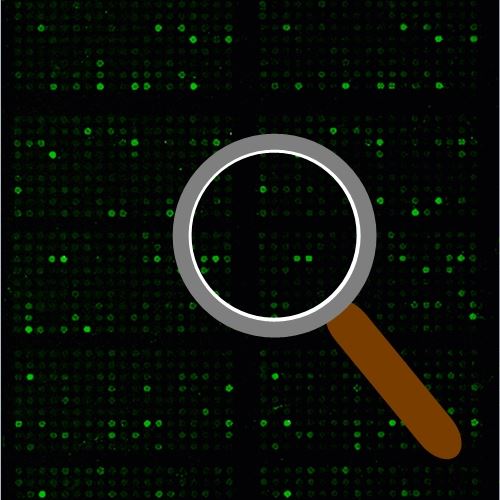AKT/PKB Phospho Antibody Array
The Phospho AKT/PKB Antibody Array is a high-throughput ELISA based antibody array for qualitative protein phosphorylation profiling. It is designed for comparing normal samples to treated or diseased samples, and identifying candidate biomarkers. This array features site-specific and phospho-specific antibodies, allowing researchers to study serine, threonine, and tyrosine phosphorylation at specific sites.
Key Features
- Site-specific phosphorylation profiling and screening with 216 antibodies
- Antibodies covalently immobilized on 3D polymer coated glass slide
- 6 replicates per antibody
- Fluorescent detection
Specifications
| Product Size: | 2 array slides per package for analyzing two samples (control vs. treated) |
| Featured Antibodies: | 216 site-specific and phospho-specific antibodies |
| Reactivity: | Human: 100% | Mouse: 90% | Rat: 78% |
| Internal Controls: | Positive controls: beta-actin; GAPDH ~~Negative controls |
| Suitable Sample Type: | Cell lysate | Tissue lysate |
| Detection Method: | Fluorescence; Compatible Scanners |
| Internal Controls: | beta-actin | GAPDH | Negative controls |
| Slide Dimensions: | 76 x 25 x 1 mm |
| Storage Condition: | 4°C for 6 months |
Product Details
14-3-3 theta/tau (Ser232), 14-3-3 zeta (Ser58), 14-3-3 zeta/delta (Thr232), AKT (Ser473), AKT (Thr308), AKT (Tyr326), AKT1 (Ser124), AKT1 (Ser246), AKT1 (Thr450), AKT1 (Thr72), AKT1 (Tyr474), AKT1S1 (Thr246), AKT2 (Ser474), BAD (Ser112), BAD (Ser134), BAD (Ser136), BAD (Ser155), BAD (Ser91/128), BCL-2 (Ser70), BCL-2 (Ser87), BCL-2 (Thr56), BCL-2 (Thr69), BIM (Ser69/65), Cyclin D1 (Thr286), eNOS (Ser1177), eNOS (Ser615), eNOS (Thr495), FAK (Ser910), FAK (Tyr397), FAK (Tyr407), FAK (Tyr576), FAK (Tyr861), FAK (Tyr925), FKHR (Ser256), FKHR (Ser319), FOXO1/3/4-PAN (Thr24/32), FOXO1A (Ser329), FOXO1A/3A (Ser322/325), Gab1 (Tyr627), Gab1 (Tyr659), Gab2 (Tyr643), GABA-RB (Ser434), GSK3a-b (Tyr216/279), GSK3a (Ser21), GSK3b (Ser9), IKKa (Thr23), IKKa/b (Ser180/181), IRS-1 (Ser1101), IRS-1 (Ser307), IRS-1 (Ser312), IRS-1 (Ser323), IRS-1 (Ser612), IRS-1 (Ser636), IRS-1 (Ser639), IRS-1 (Ser794), JAK1 (Tyr1022), LYN (Tyr507), mTOR (Ser2448), mTOR (Ser2481), mTOR (Thr2446), MYT1, p21Cip1 (Thr145), p27Kip1 (Ser10), p27Kip1 (Thr187), p53 (Ser6), p53 (Ser9), p53 (Ser15), p53 (Ser20), p53 (Ser33), p53 (Ser37), p53 (Ser46), p53 (Ser315), p53 (Ser366), p53 (Ser378), p53 (Ser392), p53 (Thr18), p53 (Thr81), p70S6K (Ser371), p70S6K (Ser411), p70S6K (Ser418), p70S6K (Ser424), p70S6K (Thr229), p70S6K (Thr389), p70S6K (Thr421), p70S6Kb (Ser423), Paxillin (Ab-118), Paxillin (Ab-31), Paxillin (Tyr118), Paxillin (Tyr31), PDK1 (Ser241), PFKFB2 (Ser483), PI3K-p85-alpha (Tyr607), PI3K-p85-a/g (Tyr467/Tyr199), PIP5K (Ser307), PP2A-a (Tyr307), PTEN (Ser370), PTEN (Ser380), PTEN (Ser380/Thr382/Thr383), RapGEF1 (Tyr504), S6 Ribosomal Protein (Ser235), S6K, SYK (Tyr323), SYK (Tyr348), SYK (Tyr525), Synapsin1 (Ab-62), Synapsin1 (Ser62), Tuberin/TSC2 (Ser939), Tuberin/TSC2 (Thr1462), WEE1 (Ser642), XIAP (Ser87)
The ELISA based AKB/PKB Phospho Antibody Array platform involves four major steps:
- Protein extraction with non-denaturing lysis buffer
- Biotinylation of protein samples
- Incubation of labeled samples with antibody array
- Detection by dye conjugated streptavidin
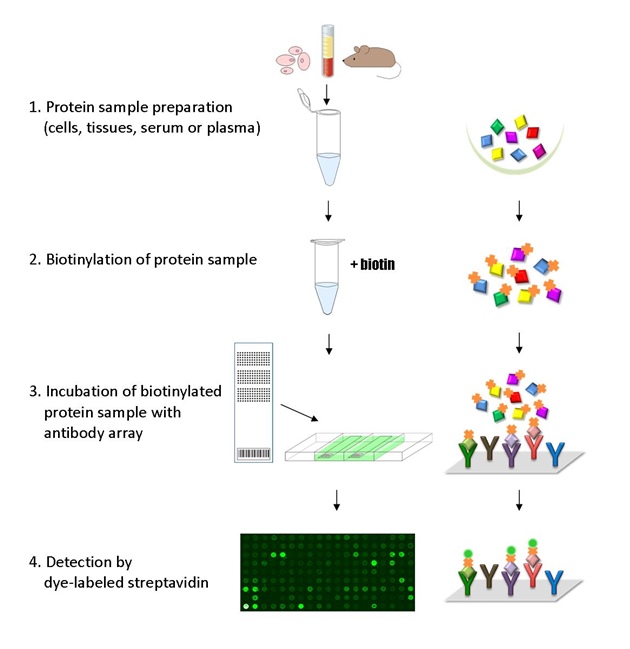
Morande PE, Sivina M, Ibrutinib therapy downregulates AID enzyme and proliferative fractions in chronic lymphocytic leukemia, Blood 2019 :blood-2018-09-876292
Peppenelli M, Miller M, Aberrant regulation of the Akt signaling network by human cytomegalovirus allows for targeting of infected monocytes, Antiviral Res, 2018 Jul 25. pii: S0166-3542(18)30211-0. doi: 10.1016/j.antiviral.2018.07.015
Reinhart R, Kaufmann T, IL-4 enhances survival of in vitro-differentiated mouse basophils through transcription-independent signaling downstream of PI3K, Cell Death & Disease, 2018 9:713
Shi F, Zhang J, The dual PI3K/mTOR inhibitor dactolisib elicits anti-tumor activity in vitro and in vivo, Oncotarget, 2018 Jan 2; 9(1): 706–717
Services
If you don’t have access to a microarray, send the finished arrays to our lab for scanning. Raw scan images are delivered in tiff format.
Cost: Free
Array Image Quantification and Analysis Service includes data extraction, data organization and analysis of the array images obtained through our array scanning service.
Cost: $250 per slide
Complete Antibody Array Assay Service allows investigators to send research samples to our laboratory for analysis. There is no need to purchase the arrays and reagents and running the assays yourself. Simply select the array of your choice, and then send off the samples to our lab. This convenient hands-off approach offers quick turnaround and reliable results, saving you valuable time and resources. All assays will be performed by our highly trained scientists at our headquarter in Sunnyvale, California. Results are delivered by email in 1-3 weeks.
Cost: $1,520 per sample

